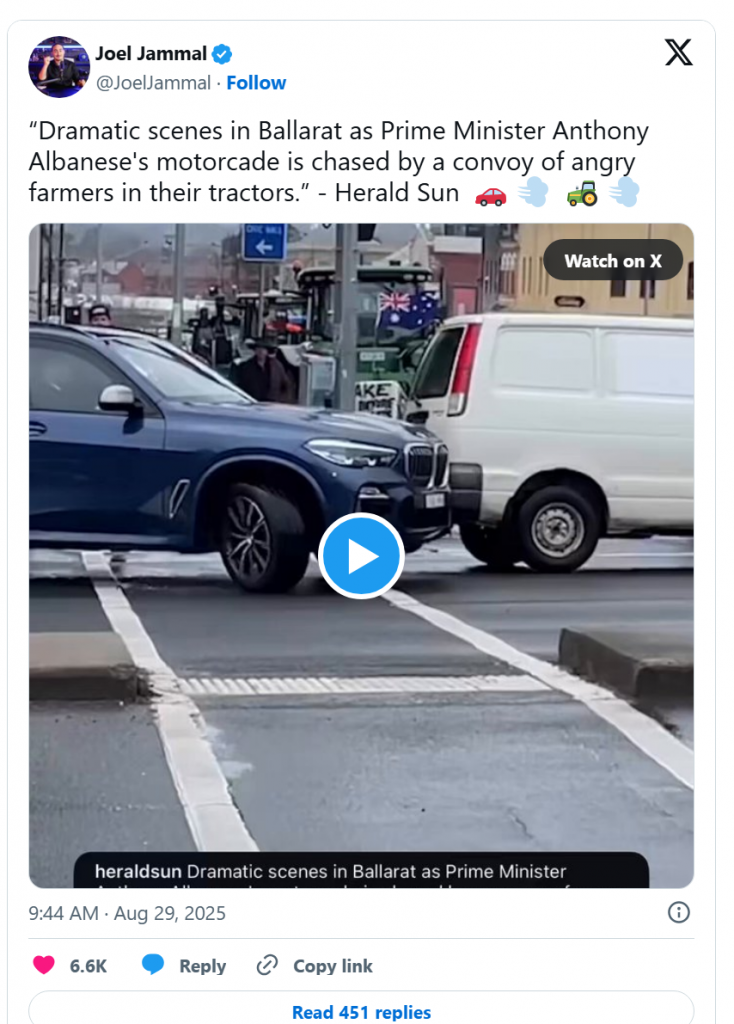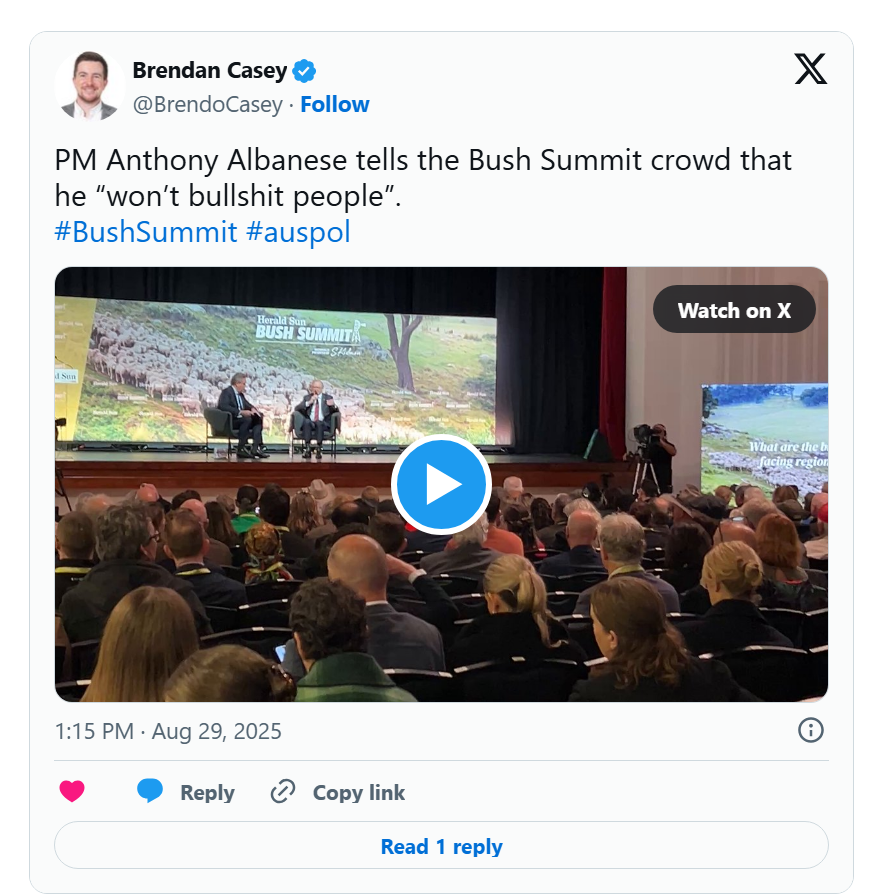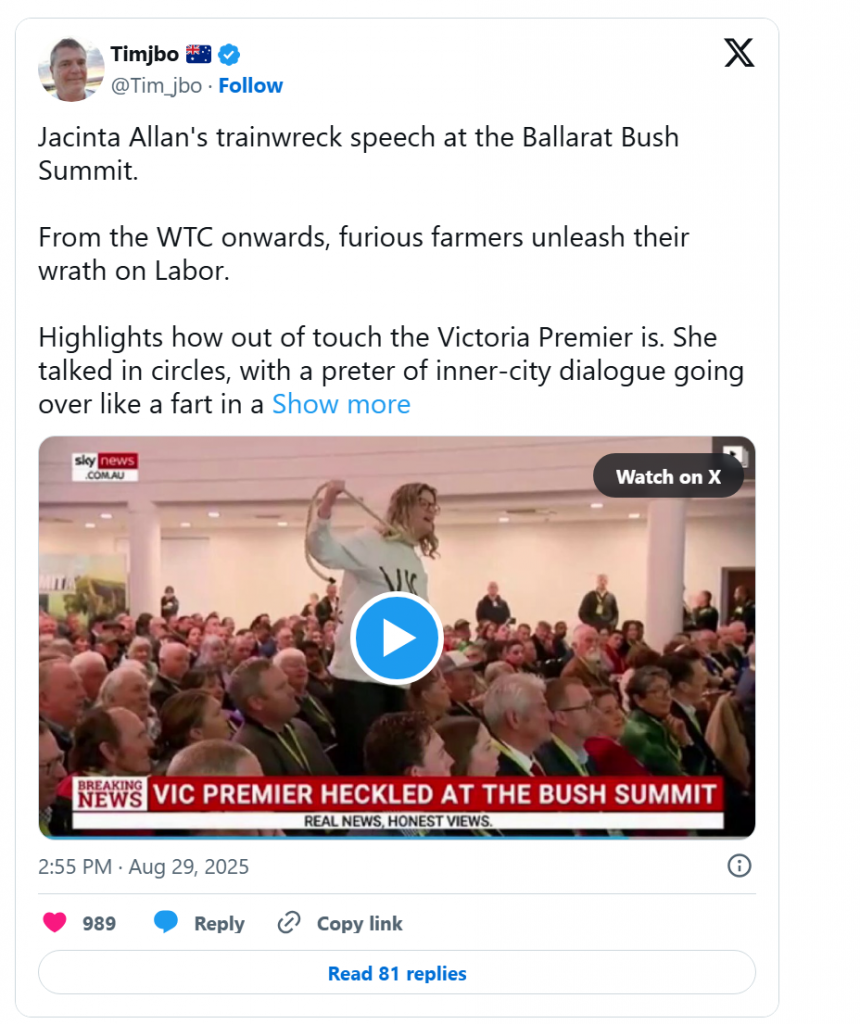Article by Flat White, courtesy of Spectator Australia
03.09.2025

There are few joys left in political life for a blue ribbon conservative, but watching the Prime Minister chased out of Ballarat by angry tractors was a lovely respite.
The scenes, quickly overlaid with the theme from Benny Hill, took place following one of the many Bush Summits.
It was a stark contrast to Nationals Senator Bridget McKenzie, who was ferried into Ballarat on a tractor. McKenzie has found a renewed popularity pushing back against the city ambitions of the Labor government to ‘industrialise farmland’.
‘We’re not going to miss the opportunity to take it right up to our Premier, right up to the Prime Minister, today at the Bush Summit…’

The Prime Minister’s motorcade swiftly exited the scene of a political massacre where Net Zero was abandoned, bruised and bleeding, on the stage.
Unpopular renewable energy projects weren’t the only reason for public anger, Victoria’s recently announced emergency services levy helped to raise tensions with some of the protesters holding signs that read, ‘Shove your levy up your arse!’
Anthony Albanese was heckled on the stage by a seriously irate crowd.
‘Why are regional communities paying the cost for renewable energy?’ asked one attendee. ‘Where is the social licence? Where is the regulation to protect our communities, value our farmland, and preserve our environment? How can state and federal governments justify enabling companies to tear our communities apart?’
The crowd cheered the question while the Prime Minister leaned into his mic, fidgeted with his tie, and attempted to look serious.
‘Quite clearly, governments haven’t … well enough in the engagement and community consultation and those processes,’ he began.
Considering ‘consultation’ has become a dirty word among regional communities, where they are essentially lectured to about what’s going to happen, it wasn’t a good start for the Prime Minister.
Albanese added, ‘There hasn’t been a new coal-fired power station begun for this century, that’s just the truth. And there hasn’t been any regulation stopping that. There is still nothing stopping that.’
Really?
There might not be any laws that prohibit a coal-fired power station, but the collective weight of anti-coal government dogma, Net Zero regulations, sharp-toothed environmental lobbyists (who routinely shut down mining operations), and market-distorting grants and subsidies certainly make it impossible.
It would be disingenuous of the Prime Minister to raise his eyebrows in astonishment that coal-fired plants have left the energy scene when it was very much a deliberate political manoeuvre of his government and others that came before.
The crowd appeared to be aware of this, and began talking-back at the Prime Minister as soon as he finished this comment.
‘It hasn’t happened because the market has determined that it doesn’t stack up.’
The market that the government heavily interferes with in favour of renewables? That market?
At this point, the comments from the crowd cannot be decoded, but their general frustrated tone is unmistakable. They don’t buy what the Prime Minister is saying, and when he smiled back at them, their protests grew louder.
‘We do need energy, and the cheapest form of energy is renewables…’
The crowd erupts in fury.
‘Climate change, the science told us, that climate change was real…’
At which point the host has to stop the interview to calm the crowd down. When advised that they would have to stop interjecting or the interview would end, someone shouted, ‘Well let him go then…’
‘…told us that the science was real and that we are seeing what the science told us would happen which is more extreme weather events and more intense. We’ve seen cyclones in non-tropical areas like off the New South Wales north coast and off the Queensland coast.’
New South Wales has a long history of cyclones. According to the ABC, between the 1940s and 1970s, the state experienced them every two years before a random break in the pattern. The return of cyclones is considered normal, not ‘climate change’.
‘At the moment we have drought, we have flooding, we have impact in South Australia and impact in Western Australia.’

The crowd are once again shouting at the Prime Minister because every farmer knows the history of drought and flood in this nation. Re-telling their history as justification for renewable energy only upset the audience further.
‘I’m happy to engage with people respectfully,’ the Prime Minister reminded farmers, whose lands are being disrespectfully torn up and divided by the government for the benefit of large energy companies. ‘I understand that some people have a different view, but what do, what I won’t ever do is come and, out of convenience, just say what is convenient and what people want to hear.’
Then, he says something true.
‘Net Zero was adopted by the Morrison government.’
Yes, farmers are cross with both major parties.
‘People need to be treated with respect. And that is what I am doing with my presence here. I will continue to engage, but I won’t bulls-t people.’

It is difficult to know if he did better or worse than the Labor Victorian Premier, who was also booed and heckled, one might say, with more voracity.
Ms Allan was shouted out constantly and told to get lost, repeatedly, as she struggled and rushed through her speech. Her attempts to empathise with the regional crowd went nowhere.
Her mentions of ‘listening’ and ‘respect’ were met with … exactly what you’d expect by a community being taxed and abused by a government obsessed with pleasing its inner-city seats with Net Zero.
By the time she said, ‘I’m so proud of the work my government is doing in regional Victoria…’ you could barely hear her over the outrage.
It must be a shock for Labor leaders to find their comfortable lines shouted down by a hostile crowd when they are usually protected by the padding of a friendly press gallery.
The Premier hasn’t gone out of her way to promote the Bush Summit speech on her social media, but the Prime Minister went into disaster recovery mode, promising $1 billion in support for farmers preparing for drought, whatever that means. It probably doesn’t mean that farmers watching transmission lines cut their paddocks apart, or their hillsides littered with skyscraper-sized wind turbines, receive compensation.
The detail says this billion dollars is a ‘new loan funding through the Regional Investment Corporation’ which offers ‘concessional loans for farm businesses and drought-affected farm-related small business’.
Hardly a gift, like the millions given to Palestine and PNG.
Regional communities received exactly what they expected from the Prime Minister and State Premier – a promise to keep ploughing ahead with Net Zero regardless of the damage done to farmers.
